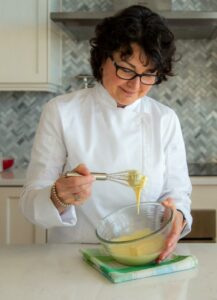
Hi, Chef Colleen. I know what a chef is, but why does it matter that you’re a food scientist? And what is a food scientist anyway?
Good question! Very simply, chefs know how to prepare foods for eating (they know a lot more than that too of course). Food scientists know what happens to food at a molecular level during food preparation and cooking.
In short – a chef knows the what and how of cooking. A food scientist knows the why of food and cooking both in terms of chemistry and physics.
 A food scientist identifies what is in food. They know what every component of a food does at a molecular level: what gives a food its specific flavour, mouth feel or appearance, and what is its nutritional value.
A food scientist identifies what is in food. They know what every component of a food does at a molecular level: what gives a food its specific flavour, mouth feel or appearance, and what is its nutritional value.
Because food scientists know food at this detailed level, they also know how to change foods either chemically by combining different ingredients or physically by heating, beating or otherwise changing the food.
Here’s an example of what I mean.
A chef can make a gingerbread dough. They know what ingredients to combine and how to achieve the right consistency and flavour. They know this information from experimenting and experience – their own and that of other chefs.
A food scientist can tell you exactly what is happening to the gingerbread dough at every step of its preparation. She can explain what happens at a molecular level when that dough is baked and what changes to expect if temperatures or baking times are changed. Food scientists know the scientific principles behind thickening, browning, combining or separating ingredients etc.
Because I am a food scientist, I know exactly what various cooking techniques and ingredients will do to a recipe and why. I know what ingredients can be eliminated or added to a dish and what the effect will be.
Understanding food science can make your cooking:
Introducing ...Sunny Gold Sweet Mustard Pickles! Dismiss